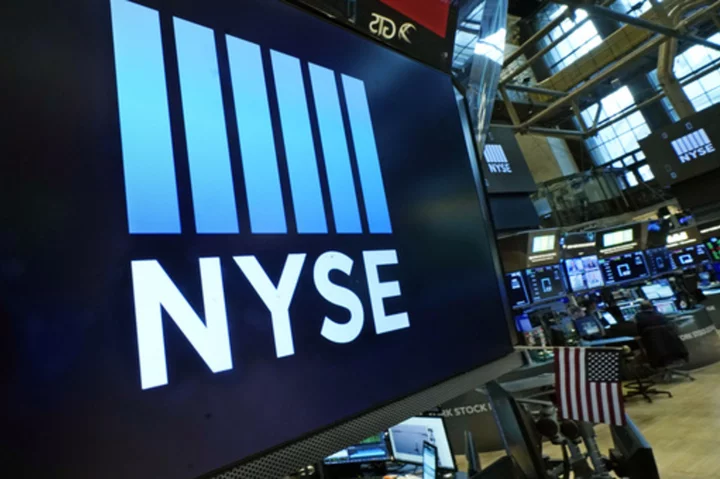NEW YORK (AP) — Stocks are drifting in early trading on Wall Street, continuing this week’s lull as markets wait for several big events next week. The S&P 500 was up less than 0.1% early Thursday, and it hasn’t moved by more than 0.4% any day this week. The Dow was up 34 points, or 0.1%, while the Nasdaq composite was up 0.2%. GameStop sank 20% after ousting the CEO who was brought in to try and turn around the struggling video game retailer. The market has been mostly calm after charging higher last week on data suggesting a long-feared recession may not be imminent.
THIS IS A BREAKING NEWS UPDATE. AP’s earlier story follows below.
Wall Street stabilized before Thursday's opening bell after a heavy sell-off a day earlier in the tech sector dragged some benchmarks lower.
Futures for the S&P 500 and the Dow Jones Industrial Average fell less than 0.1% in premarket. Global shares were mixed and oil prices rebounded after losing ground early.
Government data on jobless claims comes later Thursday and could play into the Federal Reserve's decision next week on whether to raise its main lending rate for the 11th straight time, or hold off on a hike for the first time in close to 15 months.
The labor market has remained remarkably resilient in the midst of aggressive interest rate hikes by the Fed as it combats persistently high inflation. Monthly job gains continue to surprise economists and job openings have been elevated for the better part of two years.
The Fed is raising interest rates in a bid to squelch high inflation by slowing the entire economy. The labor market has largely weathered the rate hikes, but they've put pressure on the U.S. banking, technology and manufacturing sectors.
The Fed is trying to achieve a so-called “soft landing," wherein inflation comes down and the economy cools off but no so much that it falls into a recession.
Wall Street is trying to figure which of those things are more likely to happen first and many analysts expect the Fed to leave rates alone next week. That would mark the first policy meeting in more than a year where it hasn’t hiked its benchmark rate, which is at its highest level since 2007.
In premarket trading Thursday, shares of GameStop — one of the original “meme stocks” — tumbled more than 20% after the video game retailer fired CEO Matthew Furlong. Furlong, a former Amazon executive who was brought in two years ago to turn the struggling video game retailer around.
Ryan Cohen, the company’s biggest investor, was named as executive chairman and will oversee investment and management of the company.
Elsewhere, revised figures released Thursday show that the European economy contracted slightly at the end of last year and beginning of 2023, underlining the impact of the loss of Russian natural gas and high inflation on consumer spending. That means the eurozone endured two consecutive quarters of declining output, which is one definition of recession often used in political and economic discussions, dubbed a “technical” recession.
The economic growth figure for the 20 countries that use the euro currency was revised down from zero to minus 0.1% for the fourth quarter of 2022. The number for the first three months of this year also was downgraded from scant 0.1% growth to minus 0.1%.
At midday, France's CAC 40 gained 0.3%, Germany's DAX added 0.2% and Britain's FTSE 100 was unchanged.
In Asian trading, Japan’s benchmark Nikkei 225 sank 0.9% to 31,641.27. Australia’s S&P/ASX 200 shed 0.3% to 7,099.70. South Korea’s Kospi slipped 0.2% to 2,610.85. Hong Kong’s Hang Seng edged up 0.3% to 19,299.18. The Shanghai Composite gained 0.5% to 3,213.59. Taiwan's Taiex lost 1.1%, while India's Sensex gave up 0.4%.
The Japanese government revised its estimate for growth in the January-March quarter sharply higher, to 2.7%. That was above what analysts had expected. The economy has been recovering since restrictions related to the coronavirus pandemic were lifted. The nation has seen a return of tourists, as well as other economic activity.
The focus is now on when Japan’s central bank may move away from the easy monetary policy it's stuck to for years. In the past year, the U.S. Federal Reserve and the world's other central banks have been raising interest rates. Japan's benchmark rate is minus 0.1%.
“While a higher growth reading may provide some room to consider a policy exit from the Bank of Japan, the central bank’s stance could remain unmoved for now, with recent comments from the Governor Kazuo Ueda pointing to more wait-and-see,” Yeap Jun Rong, a market analyst at IG said in a report.
In energy trading Thursday, benchmark U.S. crude gained 64 cents to $73.17 a barrel in electronic trading on the New York Mercantile Exchange. It gained 79 cents to $72.53 on Wednesday. Brent crude, the international standard, also added 64 cents, to $77.59 a barrel.
In currency trading, the U.S. dollar fell to 139.66 Japanese yen from 140.10 yen. The euro cost $1.0739, up from $1.0698.
Wednesday on Wall Street, the S&P 500 fell 0.4% though the majority of stocks within the index rose. The Dow Jones Industrial Average gained 0.3% and the tech-heavy Nasdaq composite fell 1.3%.
Microsoft, Amazon, Nvidia and Alphabet all sank at least 3% and were the heaviest weights on the S&P 500.
——
Kageyama reported from Tokyo; Ott reported from Silver Spring, Md.









